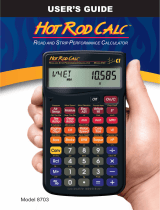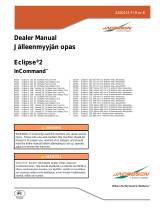Edelbrock Edelbrock AVS2 Series Carburetor Calibration Kit #1948 Installation guide
- Category
- Vacuum cleaner supplies
- Type
- Installation guide
This manual is also suitable for
Edelbrock Edelbrock AVS2 Series Carburetor Calibration Kit #1948 includes everything an enthusiast needs to fine-tune their Edelbrock carburetor for maximum performance. If you are looking to calibrate your Edelbrock carburetor the Edelbrock AVS2 Series Carburetor Calibration Kit #1948 offers a wide variety of jets, metering rods, and springs that allow for precise fuel metering adjustments. This kit is an essential tool for any enthusiast who wants to get the most out of their Edelbrock carburetor. With the Edelbrock Edelbrock AVS2 Series Carburetor Calibration Kit #1948, you can:
- Fine-tune your Edelbrock carburetor for maximum performance
Edelbrock Edelbrock AVS2 Series Carburetor Calibration Kit #1948 includes everything an enthusiast needs to fine-tune their Edelbrock carburetor for maximum performance. If you are looking to calibrate your Edelbrock carburetor the Edelbrock AVS2 Series Carburetor Calibration Kit #1948 offers a wide variety of jets, metering rods, and springs that allow for precise fuel metering adjustments. This kit is an essential tool for any enthusiast who wants to get the most out of their Edelbrock carburetor. With the Edelbrock Edelbrock AVS2 Series Carburetor Calibration Kit #1948, you can:
- Fine-tune your Edelbrock carburetor for maximum performance

-
 1
1
Edelbrock Edelbrock AVS2 Series Carburetor Calibration Kit #1948 Installation guide
- Category
- Vacuum cleaner supplies
- Type
- Installation guide
- This manual is also suitable for
Edelbrock Edelbrock AVS2 Series Carburetor Calibration Kit #1948 includes everything an enthusiast needs to fine-tune their Edelbrock carburetor for maximum performance. If you are looking to calibrate your Edelbrock carburetor the Edelbrock AVS2 Series Carburetor Calibration Kit #1948 offers a wide variety of jets, metering rods, and springs that allow for precise fuel metering adjustments. This kit is an essential tool for any enthusiast who wants to get the most out of their Edelbrock carburetor. With the Edelbrock Edelbrock AVS2 Series Carburetor Calibration Kit #1948, you can:
- Fine-tune your Edelbrock carburetor for maximum performance
Ask a question and I''ll find the answer in the document
Finding information in a document is now easier with AI
Related papers
-
Edelbrock AVS2 Series Carburetor Calibration Kit #1949 Installation guide
-
Edelbrock Edelbrock AVS2 Series Carburetor Calibration Kit #1940 Installation guide
-
Edelbrock 14851485 Operating instructions
-
Edelbrock Thunder AVS Carburetor #1826 650 CFM With Electric Choke, Satin Finish (Non-EGR) Installation guide
-
Edelbrock Carburetor Repair Kit #1477 For Square-Bore Carburetors Installation guide
-
Edelbrock Performer 600 Series Carb #1400, 50 State Legal 1980 & older GM V8, non-feedback Installation guide
-
Edelbrock Thunder AVS Carburetor #1826 650 CFM With Electric Choke, Satin Finish (Non-EGR) Installation guide
Other documents
-
Prince Castle 404-SL User manual
-
Prince Castle 398-SL User manual
-
 Calculated Industries 8703 User manual
Calculated Industries 8703 User manual
-
 Jacobsen eclipse 2 InCommand Dealer's Manual
Jacobsen eclipse 2 InCommand Dealer's Manual
-
Ransomes 63334, 63343, 63335, 63344, 63336, 63345, 63337, 63346, 63338, 63347, 63339, 63348, 63340, 63349, 63341, 63350, 63342, 63351 Owner's manual
-
Ransomes 63300-63304, 63311-63315, 63325-63332 Installation guide
-
Toro 16" Gas Trimmer User manual
-
Yamaha R-2000 User manual
-
Saab 99 1982 User manual
-
Robin America EX30 User manual


